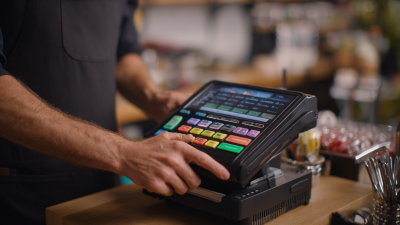In an increasingly competitive retail landscape, businesses are continually seeking innovative solutions to enhance operations and improve customer experiences. Cash Register Rolls play a crucial yet often overlooked role in this dynamic. These essential supplies not only ensure smooth transaction processing but also provide opportunities for branding, customer engagement, and data collection. By leveraging advancements in technology and incorporating digital solutions, retailers can optimize the usage of Cash Register Rolls to drive efficiency and boost profitability. In this blog, we will explore several reasons why integrating innovative practices around Cash Register Rolls can transform retail operations, pinpointing the significance of these everyday items in creating a seamless and engaging shopping experience. Join us as we delve into the ways retailers can harness the potential of Cash Register Rolls to stay ahead in today’s market.

Retailers often grapple with the inefficiencies of traditional cash register rolls, which can lead to a host of operational challenges. The constant need for inventory management, the risk of running out of rolls during peak hours, and the difficulties in maintaining clear receipts can significantly impact customer satisfaction. Additionally, using outdated paper rolls contributes to environmental concerns and additional costs, further complicating the retail landscape.
To mitigate these issues, retailers can consider transitioning to digital solutions, such as electronic receipts and cloud-based point-of-sale systems. This not only reduces the dependency on paper rolls but also streamlines the transaction process, enhancing the overall shopping experience.
The environmental impact of cash register rolls is a crucial consideration for modern retailers striving for sustainability. Traditional cash register rolls are often made from wood pulp, contributing to deforestation and excessive waste. As these rolls are used for everyday transactions, they generate a significant amount of paper waste that often ends up in landfills, where it takes years to decompose. The chemicals used in the production and printing processes can further exacerbate environmental concerns, leading to increased pollution and resource depletion.
Fortunately, there are innovative and sustainable alternatives available for retailers. For example, some companies are now offering rolls made from recycled paper or alternative materials that reduce the carbon footprint significantly. Additionally, thermal paper, which eliminates the need for ink, is gaining popularity as it not only cuts down on waste but also enhances the efficiency of printing transactions.
Implementing these eco-friendly options not only helps retailers reduce their environmental impact but also aligns with increasing consumer demand for sustainability in retail practices. As businesses continue to explore these innovative solutions, they can contribute to a greener future while improving their operational efficiency.
In today’s fast-paced retail environment, technological innovations are transforming traditional cash register rolls into powerful tools for enhancing efficiency and customer satisfaction.
Intelligent printing solutions are emerging that not only provide high-quality receipts but also integrate seamlessly with point-of-sale systems. These advanced rolls can store essential data, such as sales trends and customer preferences, allowing retailers to make informed decisions and optimize their operations.
Moreover, the shift towards eco-friendly cash register rolls is gaining traction, with many companies adopting thermal printing technology that eliminates the need for ink while using recyclable materials.
This not only reduces waste but also caters to the growing consumer demand for sustainable practices in retail. Additionally, integrating digital receipt options into cash register rolls can streamline the checkout process, allowing customers to receive their receipts via email or SMS, thus enhancing the overall shopping experience. As technology continues to evolve, cash register rolls are not just about transactions; they are becoming pivotal in reshaping the retail landscape.
Inefficient management of cash register rolls can lead to significant cost implications for retail operations. According to a report from the National Retail Federation, the average retailer experiences an annual shrinkage of approximately 1.4% of sales, amounting to billions of dollars lost each year. Much of this shrinkage can be attributed to inadequate stock management, where retailers fail to maintain optimal inventory levels of cash register rolls. As a result, delays in service and customer dissatisfaction can lead to a loss of repeat business, further exacerbating financial woes.
Moreover, a study by the Retail Industry Leaders Association highlights that nearly 30% of retailers do not track the usage and waste of their cash register rolls effectively. This lack of oversight can lead to over-ordering or under-utilization, both of which inflate costs unnecessarily. Implementing innovative inventory management systems that utilize real-time data analytics could drastically improve the efficiency of cash register roll usage, reducing waste and optimizing stock levels. By addressing these inefficiencies, retailers can not only save on operational costs but also enhance overall customer experience, which is crucial in today’s competitive market.
| Dimension | Description | Cost Implications | Potential Solutions |
|---|---|---|---|
| Inventory Management | Inefficient tracking of cash register roll inventory leading to shortages and overstock. | Increased purchasing costs due to rush orders, with potential additional shipping fees. | Implement an automated inventory tracking system and reorder alerts. |
| Waste Management | Poor management leading to expired or damaged rolls being disposed of. | Costs associated with waste disposal and loss of product value. | Regular audits and use of quality preservation techniques. |
| Supplier Relations | Reliance on a single supplier affecting pricing and delivery options. | Possible inflated costs due to lack of competition. | Develop relationships with multiple suppliers for better pricing leverage. |
| Transaction Speed | Delays in customer transactions due to inefficient roll changes or supply issues. | Loss of sales and customer dissatisfaction. | Implement efficient training protocols and ensure easy access to supplies. |
| Technological Integration | Outdated systems not integrating with modern retail technologies. | Costly manual processes and increased chance of errors. | Upgrade systems to enable better compatibility with cash register functions. |
In an era where efficiency is paramount, optimizing cash register roll usage is critical for retailers seeking to minimize operational downtime. According to a report by the National Retail Federation, over 60% of retailers identify operational disruptions as a major challenge impacting customer satisfaction and revenue. Implementing best practices around cash register rolls can significantly mitigate these issues and enhance overall retail operations.
One effective strategy is to maintain proper inventory levels of cash register rolls. Retailers that utilize inventory management software have reported a 30% reduction in stockouts, ensuring that registers are always equipped and ready for service. Additionally, training staff on the importance of promptly replacing rolls can further ensure seamless transactions. Research from the Retail Industry Leaders Association indicates that businesses that prioritize employee training see a 25% improvement in operational performance, translating to higher customer retention rates and increased sales.
Moreover, leveraging technology to automate the reordering process for cash register rolls can alleviate the burden on staff and reduce the chances of human error. According to a study by Deloitte, automating procurement can lead to a 40% decrease in operational costs. By adopting these innovative solutions, retailers can enhance their operational efficiency, leading to a smoother customer experience and ultimately boosting profitability.
This chart illustrates the average monthly usage of cash register rolls across various retail segments. It highlights the operational demands and the importance of optimizing roll usage to minimize downtime.






